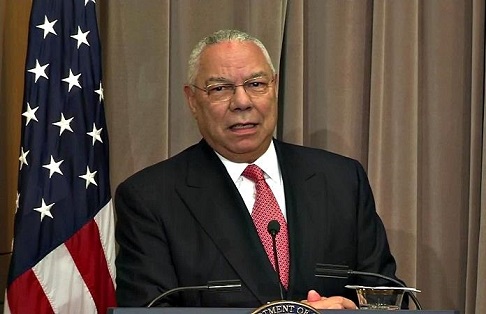[AUTHENTICITY CERTIFIED: Text version below transcribed directly from audio]
Thank you, Patrick, and thank you, ladies and gentlemen. It’s a great pleasure to be with you this afternoon on this memorable occasion.
Another memorable occasion was my first day as Secretary of State. And I was sitting in my office, and one of the senior members of the staff came in and closed the door and said, “Sir, I have to ask you something, and a lot of confusion in the building.” I said, “What’s wrong?” He said, “Well, what do we call you? Do you we call you General or Mr. Secretary?” And I said, “By all means, it’s Mr. Secretary. Now drop and give me ten.” He almost did. I had to stop him, you know.
Another question I’ve always gotten for many, many years now has to do with the connection between my time as chairman and my time as Secretary of State. And they say, “Is the leadership challenge the same? Was it the same?” And the answer is two different organizations, two different cultures, two different histories, two different, but complementary jobs that the military and the Department of State do.
But there’s one thing they have in common: They are manned by volunteers. They’re manned by people in our Foreign Service, in our Civil Service, and our Foreign Service nationals, people who volunteer to serve their nation both in the military and in the Department of State. They want to have a vision; they want to have a purpose: Why are we doing this? How does this serve the interests of the American people? How does this serve the interest of freedom and democracy around the world? How do we help the world?
They want to be taken care of. They want to make sure they get all the resources needed to get the job done. And above all, both of these, soldiers and statesmen, want to make sure that they are serving the country to the best of their ability. They’re people of courage, people of competence, people who want to make sure the American people are safe and that we’re trying to bring safety to as many people in the world as we possibly can.
If you walk out the front of this building and go down the hill, the first memorial you’ll come to is the Vietnam Wall. If you continue across the Mall, you’ll then see the Korean War Memorial, and then up the Reflecting Pool, at the other end, you’ll see the World War II Memorial. And in the distance, you’ll see the Marine Memorial. You’ll see the Navy Memorial further up the Mall. You’ll see all sorts of recognition to those men and women I was privileged to serve with as soldier and as chairman to the Joint Chiefs of Staff.
And you can do this all over this city, but you will never see anything until this moment, until this program that pays tribute to the men and women of the Department of State, the diplomats, the Foreign Service officers, the political appointees, all of the others, Civil Service included and Foreign Service nationals who do such a great job for this Department.
What do they do? Through diplomacy, we do everything we can to prevent wars. We do everything we can to stop wars or bring conflict to an end. We help after wars to rebuild the societies and economies of our former enemies. We execute treaties. We negotiate treaties and get them ratified, treaties that reduce arms or bring a peaceful level of action to different parts of the world.
We spread our values throughout the world -- without lecturing -- just by showing ourselves as a successful nation and demonstrating our values system. We execute trade negotiations and treaties which benefit us. We focus on human rights, on health, the environment. We talk to friends and adversaries, and we work with adversaries to make sure they do not become enemies.

This is vital work. This is work that is the best interest of the nation.
We talk about all the ambassadors and other diplomats we have, but my favorite Foreign Service person is the young, in his first tour, her first tour, consular office -- in some consular office somewhere in the world. This is America to the rest of the world, that person at the window. And when somebody comes up and asks for help or says “I want to go to America,” it’s that young person in their first tour who paves the way and gives a face to the American people to the people wanting to know more about America, wanting to come here.
And so we should be so proud of what these men and women have done over the years. It is only fitting, proper, and timely they get this kind of recognition through the U.S. Diplomacy Center, where we can demonstrate all that they have done and let it take its rightful place among all the other monuments and memorials and tributes that exist throughout this city.
So I express my thanks to all who have worked so hard on this.
I express my thanks to those who have contributed, to those who have put all of their energy and devotion into this center.
And I also look forward to coming back when we open this place and I can be one of the first ones through the door.
Thank you very much.
 Book/CDs by Michael E. Eidenmuller, Published by
McGraw-Hill (2008)
Book/CDs by Michael E. Eidenmuller, Published by
McGraw-Hill (2008)
Audio Source: http://www.dvidshub.net/
Audio Note: AR-XE = American Rhetoric Extreme Enhancement
Page Updated: 12/27/23
U.S Copyright Status: Text and Audio = Public domain.
